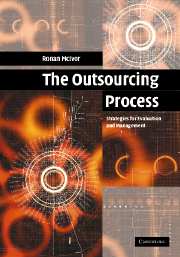Book contents
- Frontmatter
- Contents
- List of figures
- List of tables
- List of illustrations
- Acknowledgements
- 1 Introduction
- 2 The trend towards outsourcing
- 3 Theoretical influences on outsourcing
- 4 The outsourcing process: a framework for evaluation and management
- 5 Determining the current boundary of the organisation
- 6 Activity importance analysis
- 7 Capability analysis
- 8 An analysis of the strategic sourcing options
- 9 Developing the relationship strategy
- 10 Establish, manage and evaluate the relationship
- 11 Case study – outsourcing experiences at Telco
- 12 Conclusions
- Index
- References
9 - Developing the relationship strategy
Published online by Cambridge University Press: 21 August 2009
- Frontmatter
- Contents
- List of figures
- List of tables
- List of illustrations
- Acknowledgements
- 1 Introduction
- 2 The trend towards outsourcing
- 3 Theoretical influences on outsourcing
- 4 The outsourcing process: a framework for evaluation and management
- 5 Determining the current boundary of the organisation
- 6 Activity importance analysis
- 7 Capability analysis
- 8 An analysis of the strategic sourcing options
- 9 Developing the relationship strategy
- 10 Establish, manage and evaluate the relationship
- 11 Case study – outsourcing experiences at Telco
- 12 Conclusions
- Index
- References
Summary
Introduction
One of the major criticisms of outsourcing is that it is an operational tool and cannot be used as a means of building competitive advantage for an organisation. Proponents of this view argue that any activities sourced from suppliers in the supply market are also available to the competitors of the sourcing organisation. In the past, organisations have only outsourced those activities that were regarded as of peripheral concern to an organisation such as cleaning, catering and security and therefore had little impact upon the competitive position of the organisation. However, organisations are now outsourcing more critical activities such as design, manufacture, marketing, distribution and information systems. As a result of outsourcing more critical activities, organisations have been attempting to develop collaborative relationships with suppliers as they seek to reduce the risks associated with outsourcing. By employing astute relationship management mechanisms it is possible for organisations to leverage the capabilities of suppliers in a more effective way than competing organisations. Organisations are now beginning to recognise the benefits of adopting approaches for managing across and beyond the boundaries of the organisation. There is a growing awareness that competitive advantage can be based as much upon managing beyond the ownership boundaries of the organisation rather than on management within those boundaries. Competitive advantage can be achieved through the cultivation and nurturing of linkages between the sourcing organisation and its key suppliers.
Information
- Type
- Chapter
- Information
- The Outsourcing ProcessStrategies for Evaluation and Management, pp. 218 - 244Publisher: Cambridge University PressPrint publication year: 2005
